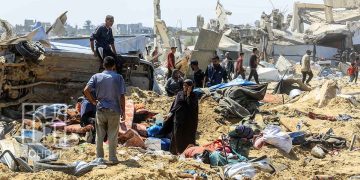Despite UN Security Council and UN General Assembly resolutions labeling these settlements as “illegitimate and unlawful,” the Israeli occupation authorities (IOA) persist in their plans to expand their settlements at the expense of Palestinian territories.
In this context, the Israeli government issued an order to seize 8,000 dunums of land in the Jordan Valley, in order to build hundreds of settlement units.
“8,000 dunums in the Jordan Valley have been allocated as Israeli land for the construction of hundreds of housing units, in addition to an area designated for industry, trade, and employment,” Israeli media sources claim.
“Planning the residential units in the area announced as state lands currently may take about a year, and it will require political-level approval,” the sources added.
The Finance Minister Bezalel Smotrich, who approved the confiscation order, was quoted as stating that: “Issuing declarations on state lands is an important and strategic matter.”
He added: “This declaration will allow the continuation of building and strengthening the Jordan Valley. At a time when there are those who seek to undermine our rights in Judea and Samaria (the West Bank) and the country in general, we are strengthening settlements through serious and strategic work throughout the country.”
There has been a discernible uptick in settlement activity in the West Bank since Benjamin Netanyahu’s government was formed at the end of 2022.
Over 720,000 Israeli settlers are thought to be living in illegal settlements in the West Bank, including East Jerusalem.
The seizure of Palestinian land for the purpose of constructing settlements is a blatant disregard for international law and the Geneva Conventions, which were designed to safeguard the rights of occupied civilians as well as the Palestinian people’s freedom of movement, economic independence, and total sovereignty over their lands. The international community has to take immediate action to put an end to these unlawful activities, guarantee the protection of Palestinian rights, and preserve the security of the region’s civilian population.
IOA confiscates 8,000 dunums of land in Jordan Valley
Latest
Sudan – Three Killed in Drone Strike on Aid Convoy in South Kordofan
February 20, 2026
IOF Arrests 37 Palestinians in the West Bank
February 19, 2026
Sudan – Three Killed in Drone Strike on Aid Convoy in South Kordofan
February 20, 2026
IOF Arrests 37 Palestinians in the West Bank
February 19, 2026
Copyright ©2020, AOHR UK All Rights Reserved.






























